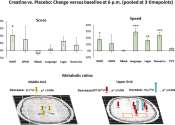Study confirms effectiveness of bivalent COVID-19 vaccine
A major bivalent COVID-19 vaccine induces production of neutralizing antibodies against the coronavirus that circulated at the start of the pandemic as well as subvariants of omicron, albeit less abundantly, according to ...
Apr 25, 2024
0
35









